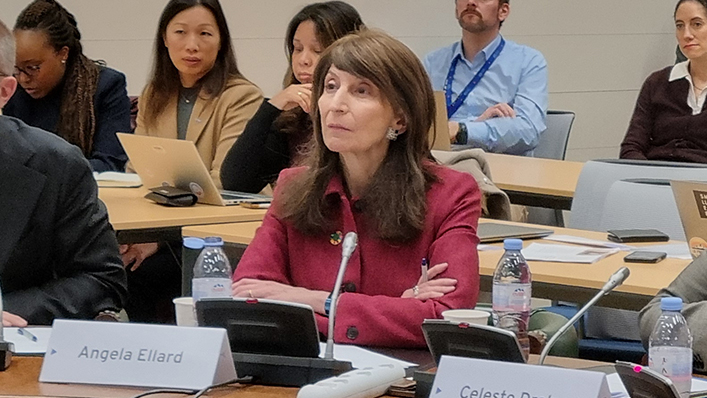
Good morning, excellencies, distinguished colleagues, and guests.
I am honoured to open today’s session, dedicated to an often-overlooked topic that holds tremendous significance for our communities and the global economy: the intersection of trade and disability inclusion. As we gather on this International Day of Persons with Disabilities, it’s important to remember a stark reality—globally, one in six adults lives with some form of disability. Those with disability are a significant part of our global population, yet their needs and perspectives are frequently overlooked in discussions about trade and economic policy. That oversight not only does a tremendous disservice to them, but also to economies as a whole, which can grow and thrive when more of their populations are able to contribute productively.
I am pleased that we are holding this event on this day dedicated to the issue. At the WTO, we are also using this day as an opportunity to raise awareness among colleagues about the daily challenges faced by persons with disabilities. Yesterday, we organized an internal event highlighting the invaluable leadership of people with disabilities through empathy, awareness, and inclusion. As part of an initiative led by an intern who uses a wheelchair, some staff members volunteered to spend the day in wheelchairs to see for themselves the challenges regarding accessibility and daily tasks and routines. Our facilities management team is continuously working to improve the accessibility of our facilities, renovating and removing barriers.
These physical challenges are just one test that many with disabilities face. But systemically, in the global economy, even more challenges abound. Trade, as we know, is more than just the exchange of goods and services. It has the power to break down systemic barriers that millions of persons with disabilities face daily—barriers to employment, participation, and opportunity. In other words, trade policies, when inclusive, can help eliminate discriminatory practices, reduce bias, and expand economic opportunities for all.
Let me give you a few examples of disability-inclusive trade policies.
- Recently, Jamaica amended its Copyright Law to enhance accessibility for individuals with visual or hearing disabilities. The amendment removes barriers and allows these individuals to access materials in accessible formats more easily.
- In Ukraine, the ongoing war has led to a steady increase in the number of persons with disabilities. Our ongoing review of Ukraine’s trade policies reveals encouraging developments: Ukraine is increasingly prioritizing the integration of persons with disabilities into economic life through its trade policy frameworks, which is so important for countries affected by conflict.
There are many more actions that governments can take. For instance, eliminating duties on goods designed to assist persons with disabilities can improve access to essential tools such as screen readers and adaptive keyboards. This can open doors to employment for people with disabilities in sectors that were previously inaccessible. The ongoing digital transformation also presents an opportunity to ensure that persons with disabilities are not left behind. Accessible digital marketplaces can enable entrepreneurs with disabilities to reach new markets, scale their businesses, and fully participate in the economy.
I am sure we will hear more great examples of disability-inclusive trade policies today.
But at the same time, research continues to reveal substantial gaps in how we integrate disability considerations into trade policies and frameworks. We need to begin bridging those gaps by exploring how we can build inclusive trade policies that account for the needs of all populations, especially those who have historically been marginalized. Such an effort aligns closely with the core objectives of the World Trade Organization as outlined in the preamble of the Marrakesh Agreement: raising living standards, promoting full employment, and advancing sustainable development.
As a Member-driven organization, the WTO relies on its Members to initiate and carry out such important initiatives. I am pleased to see the Ambassadors of South Africa and Finland actively participating today and taking the lead in spearheading this important event.
Our recent establishment of an informal, staff-level Inter-Agency Working Group on Trade and Disability Inclusion is also a promising step forward, and I would like to thank all the staff from our organizations for the work they have been doing. Through this initiative, we aim to empower governments to bring disability inclusion into their policy discussions, ensuring that persons with disabilities are fully supported and included in the global economy, to their benefit and economies as a whole.
Today’s session is an opportunity for us to learn from one another and share knowledge and experiences on how trade can be a driver of inclusive growth. As we listen and discuss, I encourage all of us to think boldly about the ways we can collectively advance disability inclusion in international trade. Each step we take toward inclusivity is a step toward a global economy that values the contributions of all individuals, respects human rights, and fosters resilience for everyone.
In closing, I want to remind us that the work we are doing has the potential to change lives. With the necessary leadership, dedication, and a strong and consistent focus on inclusion, trade can be a powerful tool for driving equality. In fact, our Members could draw some inspiration from the progress that they have made in advancing gender issues at the WTO, especially through the Informal Working Group on Trade and Gender. I am confident that if all of our organizations and Members commit to a similar level of attention and ambition, we can make substantial strides in creating trade environments that benefit persons with disabilities. Let us work together to make sure that our efforts create a world where everyone has the chance to participate, contribute, and thrive in the global economy.
Thank you.
Share
Reach us to explore global export and import deals